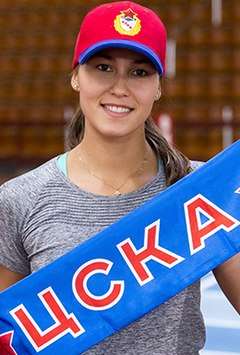Gulnaz Gubaydullina
Gulnaz Radikovna Gubaydullina (Russian: Гульназ Радиковна Губайдуллина, Bashkir: Ғөбәйҙуллина Гөлназ Радик ҡыҙы; born 14 February 1992)[1] is a Russian modern pentathlete of Bashkir descent. She has qualified for the 2016 Summer Olympics. At the 2017 World Modern Pentathlon Championships, Gubaydullina won the gold medal in the individual competition, becoming the second Russian woman to do so (the other being Elizaveta Suvorova in 1997).[2]
 | |||||||||||||||||||||||||||||
| Personal information | |||||||||||||||||||||||||||||
|---|---|---|---|---|---|---|---|---|---|---|---|---|---|---|---|---|---|---|---|---|---|---|---|---|---|---|---|---|---|
| Nationality | Russian | ||||||||||||||||||||||||||||
| Born | 14 February 1992 Novy Urengoy, Russia | ||||||||||||||||||||||||||||
| Sport | |||||||||||||||||||||||||||||
| Country | |||||||||||||||||||||||||||||
| Sport | Modern pentathlon | ||||||||||||||||||||||||||||
Medal record
| |||||||||||||||||||||||||||||
Biography
Gubaydullin started swimming in Novy Urengoy at the age of six. When she was thirteen, she participated in the double-event, winning gold in a local tournament.[3] Gubaydullina is a four-times junior and youth European champion, and a world youth silver medalist.[4][5][6] She is a bronze medalist in the mixed event at the 2010 Summer Youth Olympics.[7]
The Russian became fourth at the 2015 European Modern Pentathlon Championships, giving her a place at the 2016 Summer Olympics.[8] Although Gubaydullina set a new record in 200 m swimming (2:07.94) at the Olympics,[9] she finished just 15th (following the disqualification of Chen Qian she took the 14th position).[10][11]
Gubaydullina and Belyakov won the mixed event of the 2017 European Modern Pentathlon Championships in Minsk, Belarus.
References
- "Gulnaz Gubaydullina". UIPM. Retrieved 2 August 2016.
- Губайдуллина стала чемпионкой мира по современному пятиборью
- Гульназ Губайдуллина. Интервью со спортсменкой по современному пятиборью. Олимпиада Рио 2016
- Губайдуллина выиграла серебро ЧМ по современному пятиборью
- Претедентка на золото в пятиборье в Рио россиянка Гульназ Губайдуллина рассказала о детстве
- ГУБАЙДУЛЛИНА Гульназ Радиковна (14.02.1992)
- Гульназ Губайдуллина завоевала бронзу юношеских Олимпийских игр
- Россиянка Губайдуллина завоевала лицензию ОИ-2016 в пятиборье
- "Губайдуллина установила олимпийский рекорд в плавании пятиборок" (in Russian). Sportbox.ru. 19 August 2016. Retrieved 2016-09-12.
- Modern Pentathlon: Women's Individual
- Kate French & Samantha Murray have Rio positions upgraded